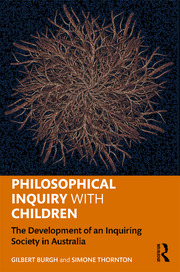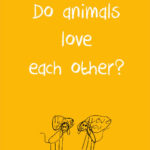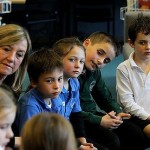Philosophical Inquiry with Children 
The Development of an Inquiring Society in Australia
By Gilbert Burgh and Simone Thornton. © 2019.
Chapter 14. Philosophy in Schools Across Australia Kate Kennedy White with Liz Fynes-Clinton, Lynne Hinton, Jill Howells, Emmanuel Skoutas, Daniel Smith & Matthew Wills.
Drawing together a wide range of eminent scholars and practitioners in the field of educational philosophy, this anthology, the first of its kind, provides not only a historical narrative, but an opportunity to reflect on the insights and experiences of the authors that have made history. The collection is divided into three parts. The overarching theme of Part I is the early years of Philosophy for Children in Australia and how they informed the course that the ‘philosophy in schools movement’ would take. Part II focuses on the events and debates surrounding the development and production of new materials, including arguments for and against the suitability of the original Philosophy for Children curriculum. In Part III, key developments relating to teaching philosophy in schools are analyzed.
Reviews
“Two elements regarding the construction of the argument of this book are what makes the book of great value to readers beyond Australia and beyond philosophy for children. First, each chapter is a combination of personal stories integrated with educational, philosophical and pedagogical theory that simultaneously focuses on P4wC and COI and broader educational and cultural issues. The second advantage of the structure of the book is the different vantage points of the authors.” – Richard Morehouse, Journal of Didactics of Philosophy
“This book offers a robust and refined picture of P4C to anyone keen to understand how P4C fits into a specific educational, cultural, and political context. Its contribution is particular timely and important for some countries that try to employ a wholistic approach to P4C intended to create a more supportive environment for P4C practitioners. This book offers a good starting point to realise not only an inquiring school community but an inquiring society/world.” – Kei Nishiyama, Philosophical Inquiry in Education
DEC SCAN JOURNAL: The Case for Philosophical Inquiry in the K-12 classroom. Britta Jensen and Kate Kennedy White. August 2014
 The terms inquiry and critical thinking appear in syllabus documents around the country. ACARA identifies creative and critical thinking as one of the seven cross-curricular (K-12) general capabilities. As such, creative and critical thinking (CCT) is recognized as part of the essential skill set needed for living and working in the 21st century. According to ACARA, the development of students’ thinking is as important as content delivery. However, ACARA does not endorse a particular method or offer suggestions as to how to teach CCT or how to promote thinking tools.
The terms inquiry and critical thinking appear in syllabus documents around the country. ACARA identifies creative and critical thinking as one of the seven cross-curricular (K-12) general capabilities. As such, creative and critical thinking (CCT) is recognized as part of the essential skill set needed for living and working in the 21st century. According to ACARA, the development of students’ thinking is as important as content delivery. However, ACARA does not endorse a particular method or offer suggestions as to how to teach CCT or how to promote thinking tools.
There is growing support for the use of philosophy in the classroom to achieve these ends. More ……
IN AUSTRALIA SYDNEY MORNING HERALD: Students swap Play-Doh for Plato, Andrew Taylor June 26, 2011
 Real philosophers cannot agree on whether stealing is ever justified so it’s little wonder year 1 and year 2 students at Bondi Public School are engaged in lively, but the civilized debate on the question.
Real philosophers cannot agree on whether stealing is ever justified so it’s little wonder year 1 and year 2 students at Bondi Public School are engaged in lively, but the civilized debate on the question.
Like Plato and Immanuel Kant, seven-year-old James believes stealing is wrong. But Salvatore, also seven, follows a more utilitarian view, arguing it may be justified to save a life.
Ned’s hand shoots up to offer an alternative view of Mr. Fox’s chicken rustling in Roald Dahl’s Fantastic Mr. Fox: ”It’s not fair to steal chickens for yourself but Mr. Fox shared his chickens with everyone.”
It’s heady stuff for young minds but the school’s philosophy teacher Kate Kennedy White said students at Bondi Public were capable of applying the rigors of philosophical inquiry to issues such as bullying, leadership, stealing, and even the deaths of the school’s four chickens the previous week. More ……..
